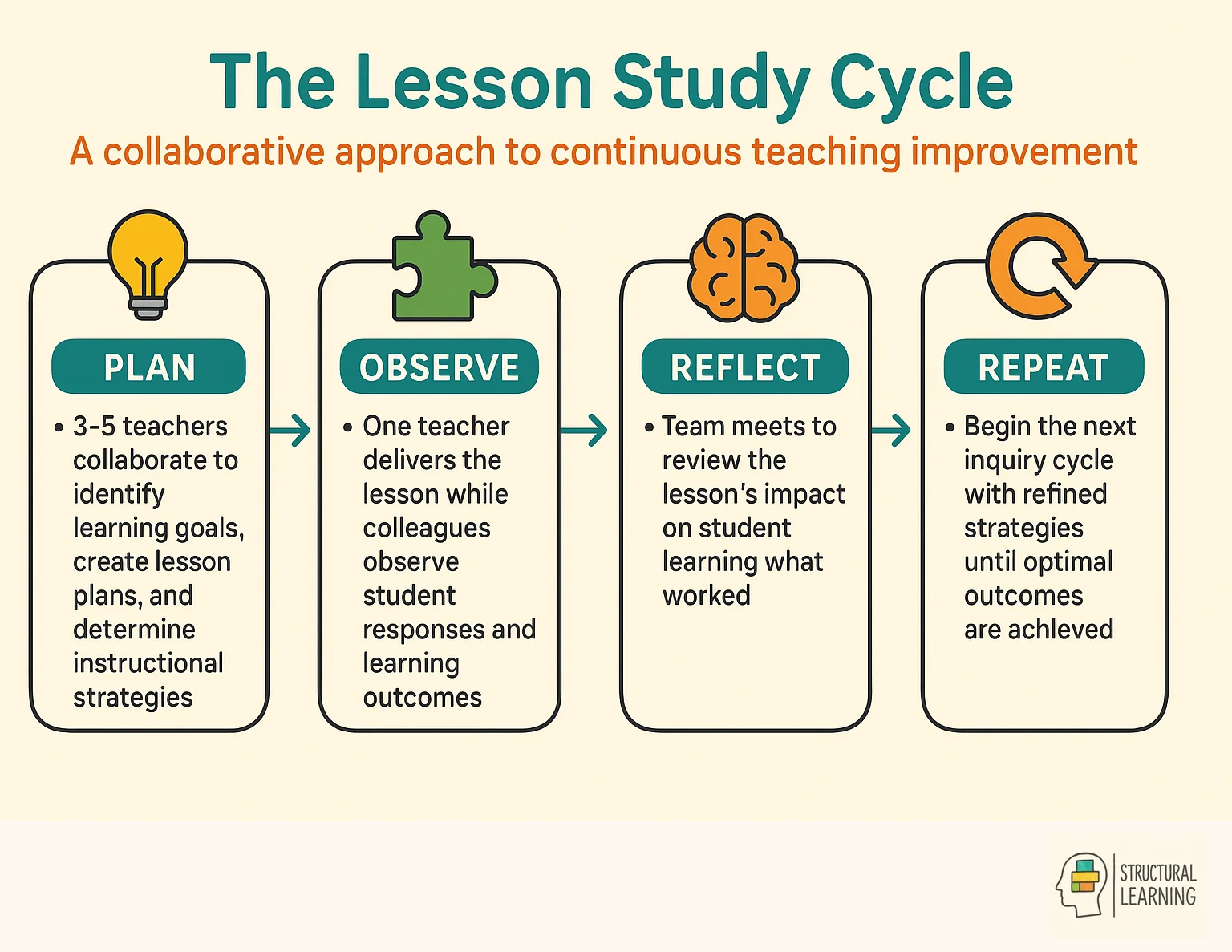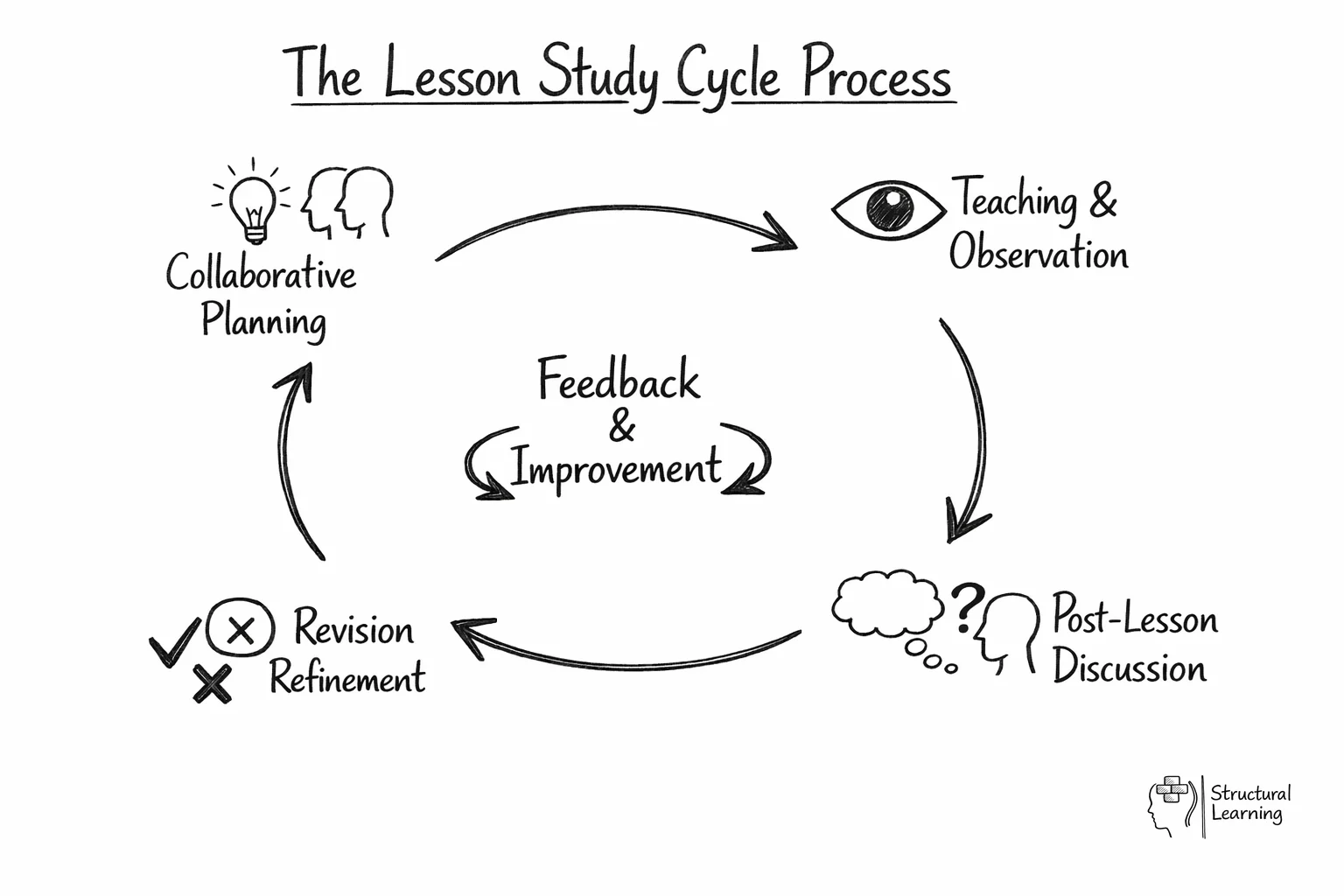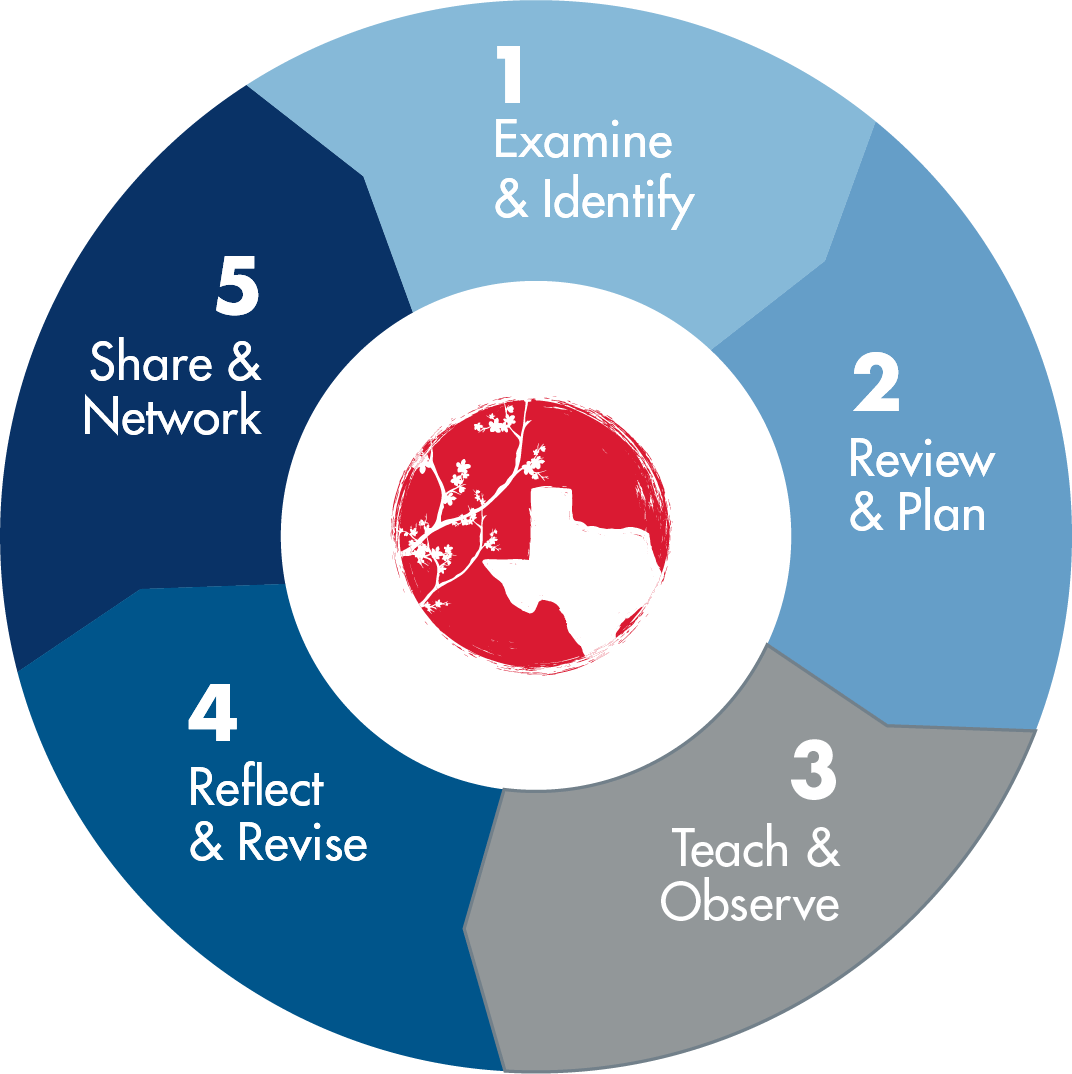Lesson Study
Discover how to implement lesson study in schools to elevate teacher professional development. Learn effective methods for collaborative action research.


Discover how to implement lesson study in schools to elevate teacher professional development. Learn effective methods for collaborative action research.
Lesson Study is a transformative approach to professional development that's steeped in collaborative action research.
Originating from Japanese educational practices, Lesson Study is a cyclical process where teachers collectively plan lessons, observe each other's teaching, and then reconvene to refine their strategies.

It's not just a one-off meeting; it's an ongoing cycle of inquiry aimed at continually enhancing curriculum resources and teaching methodologies to improve student learning outcomes.
According to Stigler and Hiebert, Lesson Study is "a process that produces more than just a good lesson plan; it produces a professional learning community."
Imagine a science class where a teacher struggles to explain the concept of osmosis. Through Lesson Study, a team of teachers collaboratively designs an effective lesson, observes its delivery, and then regroups to fine-tune the approach. The result? A more effective lesson and a teacher armed with new insights.
As we examine deeper into this article, we'll unpack the multifaceted layers of Lesson Study, exploring its theoretical underpinnings and practical applications. Intriguingly, a study found that schools implementing Lesson Study saw a 25% increase in student engagement levels.
As education researcher John Hattie aptly puts it, "Teachers need to be learners too, and Lesson Study provides the platform for this dual role."
Key Insights:
The Lesson Study cycle consists of four key steps: collaborative planning where teachers jointly design a research lesson, teaching and observation where one teacher delivers while others observe student learning, post-lesson discussion to analyse student responses and outcomes, and revision where the team refines the lesson based on evidence. This cyclical process repeats to continuously improve teaching effectiveness and student outcomes.

The lesson study cycle is a form of collaborative action research, characterised by a cycle of planning, observation, reflection and refinement.
Each begins by identifying the goals for student learning. Between three and five teachers work together to create lesson plans, determine the instructional strategies they will use, and create any additional resources they will need.
One teacher delivers a lesson to students while being observed by their colleagues from the lesson study team.
Following the lesson, the classroom teachers meet together to review the lesson's impact on pupil progress (reflection) and determine how they can refine their strategies to improve learning in the next study lesson. This forms the beginning of the second inquiry-based cycle.
The next study lesson can be delivered by the same teacher with the same class or by one of their colleagues with one of their classes. The most suitable approach will be determined by the lesson study team, and the lesson study cycles will be repeated with the goal of achieving continuous improvement.
Once enough cycles have been completed for the lesson study team to be confident that they have achieved the best outcomes for their pupils, the team will share their findings with their wider education community.
The goal is to achieve greater collective teacher efficacy throughout the profession, not just those who participated directly in the study.

Lesson Study is built on three core principles: collaborative inquiry where teachers work as researchers of their own practice, focus on learner development rather than teacher performance, and evidence-based improvement through systematic observation and reflection. These principles transform isolated teaching practices into a shared professional learning experience that directly impacts student achievement.
Stigler and Hiebert (1999) identified six pedagogical principles that explain why the lesson study method has a significant impact on educational growth.
1. Improvement is Continual and Gradual
The lesson study process is designed to produce professional growth and continuous improvement over a series of action research cycles. The process may take a few months or a whole academic year. Once it is complete, the lesson study team may choose to work with a new group of classroom management teachers to improve a different aspect of their practice.
2. Academic development is the Success Criteria
Improving student learning is the goal of each action research cycle. The teachers involved in the process focus on active learning strategies and provide structured feedback to enhance educational outcomes. This approach recognises the importance of motivation in student success and incorporates lesson observations as a key component for professional growth.active learning strategies and provide structured feedback to enhance educational outcomes. This approach recognises the importance of motivation in student success and incorporates lesson observations as a key component for professional growth.
3. Work is Collaborative
The lesson study model emphasises collective responsibility for student learning. Teachers work together as a team, sharing expertise and perspectives to create more effective teaching strategies. This collaborative approach breaks down the isolation that can often characterise teaching practice and builds stronger professional relationships within schools.
4. Practical Focus on Teaching and Learning
Rather than focusing on abstract educational theory, lesson study centres on the practical realities of classroom teaching. Teachers examine actual lessons, observe real student responses, and make concrete adjustments based on evidence from their practice.
5. Research is Teacher-Led
Teachers act as researchers of their own practice, developing skills in systematic observation, data collection, and analysis. This helps educators to take ownership of their professional development and creates a culture of inquiry within schools.
6. Knowledge is Shared Publicly
The insights gained through lesson study are shared beyond the immediate team, contributing to the broader knowledge base of the teaching profession. This principle ensures that improvements benefit individual teachers or schools and the wider educational community.
Implementing Lesson Study requires careful planning, dedicated time allocation, and strong leadership support. Schools should start with a small committed team of teachers, provide adequate professional development, and establish clear protocols for observation and reflection. Success depends on creating a culture of openness, trust, and continuous improvement.
To successfully implement lesson study in your educational setting, consider the following practical steps:
Start Small and Build Momentum
Begin with a small group of enthusiastic teachers who are committed to the process. Choose educators who are open to observation and feedback, as they will help establish a positive culture around the practice. Once the initial group demonstrates success, expand gradually to other departments or year groups.
Secure Leadership Support
Ensure that senior leadership understands and champions the lesson study approach. Leaders must provide the necessary resources, including time for planning and reflection meetings, cover for observations, and any required training or materials.
Establish Clear Protocols
Develop clear guidelines for how lesson study will operate in your school. This includes scheduling regular meetings, establishing observation protocols, and creating templates for reflection and documentation. Consistency in approach helps build confidence and ensures meaningful outcomes.
Focus on Student Learning Goals
Always begin each cycle by clearly identifying what you want students to learn and how you will recognise success. This focus keeps the process grounded in educational outcomes rather than becoming an exercise in lesson planning for its own sake.
Lesson Study represents a powerful fundamental change from isolated teaching practice to collaborative professional learning. By embracing this cyclical approach of planning, observation, and reflection, educators can move beyond individual improvement to create genuine communities of practice that benefit all students.
The evidence is clear: schools that implement lesson study effectively see significant improvements in both teacher confidence and student outcomes. The process transforms teaching from a private practice into a shared professional endeavour, where collective expertise drives continuous improvement. As educational challenges become increasingly complex, the collaborative problem-solving approach of lesson study offers a sustainable pathway for professional growth.
For schools ready to embark on this journey, remember that success comes not from perfect implementation, but from genuine commitment to the process of inquiry and improvement. Start small, focus on student learning, and trust in the power of collaborative reflection to transform your teaching practice. The investment in time and resources will yield dividends in the form of more effective teaching and enhanced student achievement across your entire educational community.
Collaborative teacher learning
To deepen your understanding of Lesson Study and its implementation, consider exploring these key research papers and resources:
Additionally, consider exploring the work of the National Centre for Excellence in the Teaching of Mathematics (NCETM) in the UK, which has developed extensive resources for implementing lesson study in mathematics education. The Lesson Study Alliance also provides valuable practical resources and case studies from schools implementing lesson study across various subjects.
For those interested in the theoretical foundations, the works of Japanese educators such as Makoto Yoshida and Akihiko Takahashi offer authentic insights into the origins and philosophy of lesson study practice.
Lesson Study is a transformative approach to professional development that's steeped in collaborative action research.
Originating from Japanese educational practices, Lesson Study is a cyclical process where teachers collectively plan lessons, observe each other's teaching, and then reconvene to refine their strategies.

It's not just a one-off meeting; it's an ongoing cycle of inquiry aimed at continually enhancing curriculum resources and teaching methodologies to improve student learning outcomes.
According to Stigler and Hiebert, Lesson Study is "a process that produces more than just a good lesson plan; it produces a professional learning community."
Imagine a science class where a teacher struggles to explain the concept of osmosis. Through Lesson Study, a team of teachers collaboratively designs an effective lesson, observes its delivery, and then regroups to fine-tune the approach. The result? A more effective lesson and a teacher armed with new insights.
As we examine deeper into this article, we'll unpack the multifaceted layers of Lesson Study, exploring its theoretical underpinnings and practical applications. Intriguingly, a study found that schools implementing Lesson Study saw a 25% increase in student engagement levels.
As education researcher John Hattie aptly puts it, "Teachers need to be learners too, and Lesson Study provides the platform for this dual role."
Key Insights:
The Lesson Study cycle consists of four key steps: collaborative planning where teachers jointly design a research lesson, teaching and observation where one teacher delivers while others observe student learning, post-lesson discussion to analyse student responses and outcomes, and revision where the team refines the lesson based on evidence. This cyclical process repeats to continuously improve teaching effectiveness and student outcomes.

The lesson study cycle is a form of collaborative action research, characterised by a cycle of planning, observation, reflection and refinement.
Each begins by identifying the goals for student learning. Between three and five teachers work together to create lesson plans, determine the instructional strategies they will use, and create any additional resources they will need.
One teacher delivers a lesson to students while being observed by their colleagues from the lesson study team.
Following the lesson, the classroom teachers meet together to review the lesson's impact on pupil progress (reflection) and determine how they can refine their strategies to improve learning in the next study lesson. This forms the beginning of the second inquiry-based cycle.
The next study lesson can be delivered by the same teacher with the same class or by one of their colleagues with one of their classes. The most suitable approach will be determined by the lesson study team, and the lesson study cycles will be repeated with the goal of achieving continuous improvement.
Once enough cycles have been completed for the lesson study team to be confident that they have achieved the best outcomes for their pupils, the team will share their findings with their wider education community.
The goal is to achieve greater collective teacher efficacy throughout the profession, not just those who participated directly in the study.

Lesson Study is built on three core principles: collaborative inquiry where teachers work as researchers of their own practice, focus on learner development rather than teacher performance, and evidence-based improvement through systematic observation and reflection. These principles transform isolated teaching practices into a shared professional learning experience that directly impacts student achievement.
Stigler and Hiebert (1999) identified six pedagogical principles that explain why the lesson study method has a significant impact on educational growth.
1. Improvement is Continual and Gradual
The lesson study process is designed to produce professional growth and continuous improvement over a series of action research cycles. The process may take a few months or a whole academic year. Once it is complete, the lesson study team may choose to work with a new group of classroom management teachers to improve a different aspect of their practice.
2. Academic development is the Success Criteria
Improving student learning is the goal of each action research cycle. The teachers involved in the process focus on active learning strategies and provide structured feedback to enhance educational outcomes. This approach recognises the importance of motivation in student success and incorporates lesson observations as a key component for professional growth.active learning strategies and provide structured feedback to enhance educational outcomes. This approach recognises the importance of motivation in student success and incorporates lesson observations as a key component for professional growth.
3. Work is Collaborative
The lesson study model emphasises collective responsibility for student learning. Teachers work together as a team, sharing expertise and perspectives to create more effective teaching strategies. This collaborative approach breaks down the isolation that can often characterise teaching practice and builds stronger professional relationships within schools.
4. Practical Focus on Teaching and Learning
Rather than focusing on abstract educational theory, lesson study centres on the practical realities of classroom teaching. Teachers examine actual lessons, observe real student responses, and make concrete adjustments based on evidence from their practice.
5. Research is Teacher-Led
Teachers act as researchers of their own practice, developing skills in systematic observation, data collection, and analysis. This helps educators to take ownership of their professional development and creates a culture of inquiry within schools.
6. Knowledge is Shared Publicly
The insights gained through lesson study are shared beyond the immediate team, contributing to the broader knowledge base of the teaching profession. This principle ensures that improvements benefit individual teachers or schools and the wider educational community.
Implementing Lesson Study requires careful planning, dedicated time allocation, and strong leadership support. Schools should start with a small committed team of teachers, provide adequate professional development, and establish clear protocols for observation and reflection. Success depends on creating a culture of openness, trust, and continuous improvement.
To successfully implement lesson study in your educational setting, consider the following practical steps:
Start Small and Build Momentum
Begin with a small group of enthusiastic teachers who are committed to the process. Choose educators who are open to observation and feedback, as they will help establish a positive culture around the practice. Once the initial group demonstrates success, expand gradually to other departments or year groups.
Secure Leadership Support
Ensure that senior leadership understands and champions the lesson study approach. Leaders must provide the necessary resources, including time for planning and reflection meetings, cover for observations, and any required training or materials.
Establish Clear Protocols
Develop clear guidelines for how lesson study will operate in your school. This includes scheduling regular meetings, establishing observation protocols, and creating templates for reflection and documentation. Consistency in approach helps build confidence and ensures meaningful outcomes.
Focus on Student Learning Goals
Always begin each cycle by clearly identifying what you want students to learn and how you will recognise success. This focus keeps the process grounded in educational outcomes rather than becoming an exercise in lesson planning for its own sake.
Lesson Study represents a powerful fundamental change from isolated teaching practice to collaborative professional learning. By embracing this cyclical approach of planning, observation, and reflection, educators can move beyond individual improvement to create genuine communities of practice that benefit all students.
The evidence is clear: schools that implement lesson study effectively see significant improvements in both teacher confidence and student outcomes. The process transforms teaching from a private practice into a shared professional endeavour, where collective expertise drives continuous improvement. As educational challenges become increasingly complex, the collaborative problem-solving approach of lesson study offers a sustainable pathway for professional growth.
For schools ready to embark on this journey, remember that success comes not from perfect implementation, but from genuine commitment to the process of inquiry and improvement. Start small, focus on student learning, and trust in the power of collaborative reflection to transform your teaching practice. The investment in time and resources will yield dividends in the form of more effective teaching and enhanced student achievement across your entire educational community.
Collaborative teacher learning
To deepen your understanding of Lesson Study and its implementation, consider exploring these key research papers and resources:
Additionally, consider exploring the work of the National Centre for Excellence in the Teaching of Mathematics (NCETM) in the UK, which has developed extensive resources for implementing lesson study in mathematics education. The Lesson Study Alliance also provides valuable practical resources and case studies from schools implementing lesson study across various subjects.
For those interested in the theoretical foundations, the works of Japanese educators such as Makoto Yoshida and Akihiko Takahashi offer authentic insights into the origins and philosophy of lesson study practice.
{"@context":"https://schema.org","@graph":[{"@type":"Article","@id":"https://www.structural-learning.com/post/lesson-study#article","headline":"Lesson Study","description":"Discover how to implement lesson study in schools to elevate teacher professional development. Learn step-by-step methods for effective collaborative action...","datePublished":"2023-10-30T12:26:52.774Z","dateModified":"2026-01-26T10:09:32.212Z","author":{"@type":"Person","name":"Paul Main","url":"https://www.structural-learning.com/team/paulmain","jobTitle":"Founder & Educational Consultant"},"publisher":{"@type":"Organization","name":"Structural Learning","url":"https://www.structural-learning.com","logo":{"@type":"ImageObject","url":"https://cdn.prod.website-files.com/5b69a01ba2e409e5d5e055c6/6040bf0426cb415ba2fc7882_newlogoblue.svg"}},"mainEntityOfPage":{"@type":"WebPage","@id":"https://www.structural-learning.com/post/lesson-study"},"image":"https://cdn.prod.website-files.com/5b69a01ba2e409501de055d1/69518c7ac4cf323b4c3af05e_69518c789517d8d65b24666c_lesson-study-infographic.webp","wordCount":3297},{"@type":"BreadcrumbList","@id":"https://www.structural-learning.com/post/lesson-study#breadcrumb","itemListElement":[{"@type":"ListItem","position":1,"name":"Home","item":"https://www.structural-learning.com/"},{"@type":"ListItem","position":2,"name":"Blog","item":"https://www.structural-learning.com/blog"},{"@type":"ListItem","position":3,"name":"Lesson Study","item":"https://www.structural-learning.com/post/lesson-study"}]},{"@type":"FAQPage","@id":"https://www.structural-learning.com/post/lesson-study#faq","mainEntity":[{"@type":"Question","name":"What exactly is Lesson Study and how does it differ from traditional professional development?","acceptedAnswer":{"@type":"Answer","text":"Lesson Study is a cyclical, collaborative approach to professional development rooted in Japanese educational practices where teachers collectively plan lessons, observe each other's teaching, and refine their strategies together. Unlike traditional one-off training sessions, it creates an ongoing c"}},{"@type":"Question","name":"How does the Lesson Study cycle actually work in practice?","acceptedAnswer":{"@type":"Answer","text":"The cycle consists of four key steps: collaborative planning where 3-5 teachers jointly design a research lesson, teaching and observation where one teacher delivers whilst others observe student learning, post-lesson discussion to analyse student responses, and revision where the team refines the l"}},{"@type":"Question","name":"Why does Lesson Study focus on observing students rather than evaluating teachers?","acceptedAnswer":{"@type":"Answer","text":"Unlike formal lesson observations used for appraisal, Lesson Study emphasises teaching impact on student learning rather than teacher performance. Observers focus on how pupils respond to instruction, what engages them, and evidence of learning outcomes, which provides concrete data for improving le"}},{"@type":"Question","name":"What are the main benefits schools can expect from implementing Lesson Study?","acceptedAnswer":{"@type":"Answer","text":"Research shows schools using Lesson Study see a 25% increase in student engagement levels and develop stronger professional learning communities. Teachers gain new insights through collaborative planning, break free from isolation, and develop skills in action research that lead to continuous improv"}},{"@type":"Question","name":"How long does a complete Lesson Study cycle take and how many teachers should be involved?","acceptedAnswer":{"@type":"Answer","text":"A complete Lesson Study process typically takes a few months to a whole academic year, depending on how many cycles are needed to achieve optimal results. Between three and five teachers work together as a team, often with similar levels of experience and expertise to ensure joint decision-making. T"}}]}]}